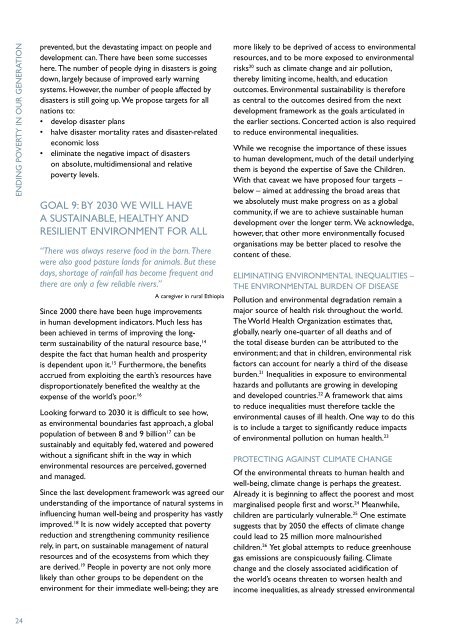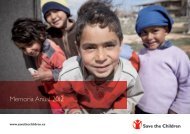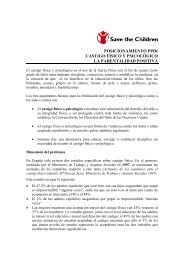ENDING poverty - Save the Children
ENDING poverty - Save the Children
ENDING poverty - Save the Children
Create successful ePaper yourself
Turn your PDF publications into a flip-book with our unique Google optimized e-Paper software.
<strong>ENDING</strong> POVERTY IN OUR GENERATION<br />
prevented, but <strong>the</strong> devastating impact on people and<br />
development can. There have been some successes<br />
here. The number of people dying in disasters is going<br />
down, largely because of improved early warning<br />
systems. However, <strong>the</strong> number of people affected by<br />
disasters is still going up. We propose targets for all<br />
nations to:<br />
<br />
<br />
economic loss<br />
<br />
on absolute, multidimensional and relative<br />
<strong>poverty</strong> levels.<br />
GOAL 9: BY 2030 WE WILL HAVE<br />
A SUSTAINABLE, HEALTHY AND<br />
RESILIENT ENVIRONMENT FOR ALL<br />
“There was always reserve food in <strong>the</strong> barn. There<br />
were also good pasture lands for animals. But <strong>the</strong>se<br />
days, shortage of rainfall has become frequent and<br />
<strong>the</strong>re are only a few reliable rivers.”<br />
A caregiver in rural Ethiopia<br />
Since 2000 <strong>the</strong>re have been huge improvements<br />
in human development indicators. Much less has<br />
been achieved in terms of improving <strong>the</strong> longterm<br />
sustainability of <strong>the</strong> natural resource base, 14<br />
despite <strong>the</strong> fact that human health and prosperity<br />
is dependent upon it. 15 Fur<strong>the</strong>rmore, <strong>the</strong> benefits<br />
accrued from exploiting <strong>the</strong> earth’s resources have<br />
disproportionately benefited <strong>the</strong> wealthy at <strong>the</strong><br />
expense of <strong>the</strong> world’s poor. 16<br />
Looking forward to 2030 it is difficult to see how,<br />
as environmental boundaries fast approach, a global<br />
population of between 8 and 9 billion 17 can be<br />
sustainably and equitably fed, watered and powered<br />
without a significant shift in <strong>the</strong> way in which<br />
environmental resources are perceived, governed<br />
and managed.<br />
Since <strong>the</strong> last development framework was agreed our<br />
understanding of <strong>the</strong> importance of natural systems in<br />
influencing human well-being and prosperity has vastly<br />
improved. 18 It is now widely accepted that <strong>poverty</strong><br />
reduction and streng<strong>the</strong>ning community resilience<br />
rely, in part, on sustainable management of natural<br />
resources and of <strong>the</strong> ecosystems from which <strong>the</strong>y<br />
are derived. 19 People in <strong>poverty</strong> are not only more<br />
likely than o<strong>the</strong>r groups to be dependent on <strong>the</strong><br />
environment for <strong>the</strong>ir immediate well-being; <strong>the</strong>y are<br />
more likely to be deprived of access to environmental<br />
resources, and to be more exposed to environmental<br />
risks 20 such as climate change and air pollution,<br />
<strong>the</strong>reby limiting income, health, and education<br />
outcomes. Environmental sustainability is <strong>the</strong>refore<br />
as central to <strong>the</strong> outcomes desired from <strong>the</strong> next<br />
development framework as <strong>the</strong> goals articulated in<br />
<strong>the</strong> earlier sections. Concerted action is also required<br />
to reduce environmental inequalities.<br />
While we recognise <strong>the</strong> importance of <strong>the</strong>se issues<br />
to human development, much of <strong>the</strong> detail underlying<br />
<strong>the</strong>m is beyond <strong>the</strong> expertise of <strong>Save</strong> <strong>the</strong> <strong>Children</strong>.<br />
With that caveat we have proposed four targets –<br />
below – aimed at addressing <strong>the</strong> broad areas that<br />
we absolutely must make progress on as a global<br />
community, if we are to achieve sustainable human<br />
development over <strong>the</strong> longer term. We acknowledge,<br />
however, that o<strong>the</strong>r more environmentally focused<br />
organisations may be better placed to resolve <strong>the</strong><br />
content of <strong>the</strong>se.<br />
ELIMINATING ENVIRONMENTAL INEQUALITIES –<br />
THE ENVIRONMENTAL BURDEN OF DISEASE<br />
Pollution and environmental degradation remain a<br />
major source of health risk throughout <strong>the</strong> world.<br />
<br />
globally, nearly one-quarter of all deaths and of<br />
<strong>the</strong> total disease burden can be attributed to <strong>the</strong><br />
environment; and that in children, environmental risk<br />
factors can account for nearly a third of <strong>the</strong> disease<br />
burden. 21 Inequalities in exposure to environmental<br />
<br />
and developed countries. 22 A framework that aims<br />
to reduce inequalities must <strong>the</strong>refore tackle <strong>the</strong><br />
environmental causes of ill health. One way to do this<br />
is to include a target to significantly reduce impacts<br />
of environmental pollution on human health. 23<br />
PROTECTING AGAINST CLIMATE CHANGE<br />
Of <strong>the</strong> environmental threats to human health and<br />
well-being, climate change is perhaps <strong>the</strong> greatest.<br />
Already it is beginning to affect <strong>the</strong> poorest and most<br />
marginalised people first and worst. 24 Meanwhile,<br />
children are particularly vulnerable. 25 One estimate<br />
suggests that by 2050 <strong>the</strong> effects of climate change<br />
could lead to 25 million more malnourished<br />
children. 26 Yet global attempts to reduce greenhouse<br />
gas emissions are conspicuously failing. Climate<br />
change and <strong>the</strong> closely associated acidification of<br />
<strong>the</strong> world’s oceans threaten to worsen health and<br />
income inequalities, as already stressed environmental<br />
24
















